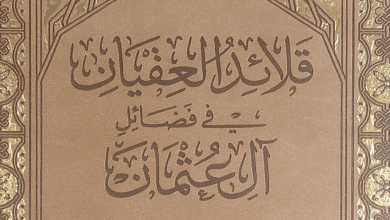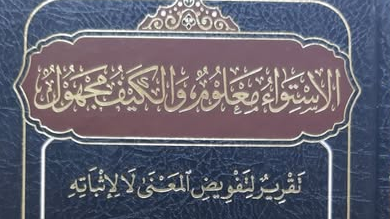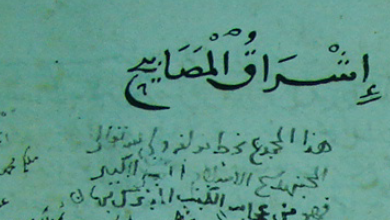Pseudo-Salafis admit: ‘Indeed, all of the explainers of (Sahih) al-Bukhari were Ash’aris and many besides them’
العنوان الأشاعرة والماتريدية من أهل السنة والجماعة
المجيب جمع من العلماء
التصنيف الفهرسة/ العقائد والمذاهب الفكرية/الأديان والمذاهب الفكرية المعاصرة
التاريخ 29/06/1427هـالسؤال
ما حكم التعامل مع المخالف لعقيدة السلف الصالح كالأشاعرة والماتريدية ومن نحا نحوهم والتعاون معهم على البر والتقوى والأمور العامة وهل يحرم العمل معهم سواء كانت الإدارة لنا وهم يعملون تحتنا أو العمل تحت إشرافهم؟ وهل هم من الفرق الضالة الاثنتين والسبعين؟ وهل التعامل معهم يعد من باب تولي غير المؤمنين؟.
الجواب
الحمد لله، والصلاة والسلام على رسول الله وبعد:
فجواباً على ذلك نقول: الأشاعرة والماتريدية قد خالفوا الصواب حين أولوا بعض صفات الله سبحانه. لكنهم من أهل السنة والجماعة، وليسوا من الفرق الضالة الاثنتين والسبعين إلا من غلا منهم في التعطيل، ووافق الجهمية فحكمه حكم الجهمية. أما سائر الأشاعرة والماتريدية فليسوا كذلك وهم معذورون في اجتهادهم وإن أخطأوا الحق.
ويجوز التعامل والتعاون معهم على البر والإحسان والتقوى، وهذا شيخ الإسلام ابن تيمية رحمه الله قد تتلمذ على كثير من العلماء الأشاعرة، بل قد قاتل تحت راية أمراء المماليك حكام ذلك الزمان وعامتهم أشاعرة، بل كان القائد المجاهد البطل نور الدين زنكي الشهيد، وكذا صلاح الدين الأيوبي من الأشاعرة كما نص عليه الذهبي في سير أعلام النبلاء، وغيرهما كثير من العلماء والقواد والمصلحين، بل إن كثيراً من علماء المسلمين وأئمتهم أشاعرة وماتريدية، كأمثال البيهقي والنووي وابن الصلاح والمزي وابن حجر العسقلاني والعراقي والسخاوي والزيلعي والسيوطي، بل جميع شراح البخاري هم أشاعرة وغيرهم كثير، ومع ذلك استفاد الناس من عملهم، وأقروا لهم بالفضل والإمامة في الدين، مع اعتقاد كونهم معذورين فيما اجتهدوا فيه وأخطأوا، والله يعفو عنهم ويغفر لهم. والخليفة المأمون كان جهمياً معتزلياً وكذلك المعتصم والواثق كانوا جهمية ضُلاَّلاً. ومع ذلك لم يفت أحد من أئمة الإسلام بعدم جواز الاقتداء بهم في الصلوات والقتال تحت رايتهم في الجهاد، فلم يفت أحد مثلاً بتحريم القتال مع المعتصم يوم عمورية، مع توافر الأئمة في ذلك الزمان كأمثال أحمد والبخاري ومسلم والترمذي وأبي داود وعلي بن المديني ويحيى بن معين وأضرابهم من كبار أئمة القرن الهجري الثالث. ولم نسمع أن أحداً منهم حرم التعامل مع أولئك القوم، أو منع الاقتداء بهم، أو القتال تحت رايتهم. فيجب أن نتأدب بأدب السلف مع المخالف.
والله أعلم وصلى الله على محمد وعلى آله وصحبه وسلم.د. عبد العزيز بن عبد الفتاح القارئ عميد كلية القرآن في الجامعة الإسلامية سابقًا
د. محمد بن ناصر السحيباني المدرس بالمسجد النبوي
د. عبد الله بن محمد الغنيمانرئيس قسم الدراسات العليا بالجامعة الإسلامية سابقا
الذي علق على الفتوى قائلاً:
“هذا جواب سديد صحيح ولا يسع المسلمين إلا ذلك، ولم يزل الخلاف يقع في صفوف العلماء، ولم يكن ذلك مسبباً لاختلاف القلوب والتفرق، وقصة الصحابة لما ذهبوا إلى بني قريظة معروفة مشهورة وغيرها، قاله عبد الله بن محمد الغنيمان. تحريراً في 22/4/1427
هـ
The Ash’aris and Maturidis are from Ahl us Sunnah wal Jama’ah
Answered by: A group of scholars and authors.
Date: 06/1427/09.
Translated for IslamicNetwork.com
Question: What is the ruling on working with the opponents to the creed of Salaf as-Salih, such as the Ash’aris and Maturidis and those who follow their way, and cooperating with them in matters of goodness and piety and general affairs? Is it forbidden to work with them no matter if the administration was in our conrol and they work under our auspices, or if it was under their control? Are they from seventy-two misguided sects, and is working with them considered from the realm of alligience with other than the belivers?
Answer: All praise is for Allah, and may the Salah and Salam be upon the Messenger of Allah. In response to this we say: The Ash’aris and Maturidis have opposed what is correct when they performed Ta’wil of the Divine Attributes of Allah the Exalted, however, they are from Ahl us Sunnah wal Jama’ah and not from the seventy-two misguided sects except those who go into extremes among them in denial and agree with the Jahmiyah- where his ruling would then be like those of the Jahmiyah. As for the remainder of the Ash’aris and Maturidis, then they are not like that, and they are excused for their Ijtihad even if they erred in the truth. It is permissble to work and cooperate with them in piety, righteousness and goodness. Take Ibn Taymiyah, who studied under many of the scholars of the Ash’aris, nay, he even fought under the banner of the Mamlukes- the rulers of that time-and the generality of them were Ash’aris, nay, the military leader of that time, the brave Nuruddin al-Zanki the martyr as well as Salahuddin al-Ayubi were both Ash’aris, as has been stated by Imam adh-Dhahabi in his Siyar ‘Alam an-Nubala. And there were many besides them from the scholars, military leaders and people of rectification. Many of the scholars and Imams of the Muslims were Ash’aris and Maturidis such as; al-Bayhaqi, al-Nawawi, Ibn al-Salah, al-Mizzi, Ibn Hajr al-Asqalani, al-Iraqi, al-Sakhawi, al-Zayla’i, al-Suyuti, and indeed, all of the explainers of (Sahih) al-Bukhari were Ash’aris and many besides them. So with this, the people benefited from their knowledge and admitted their virtue and leadership in the Deen while believing them to be excused for what they made Ijtihad in and erred. May Allah forgive them and pardon them. The Khalifah al-Ma’mun was a Jahmi Mu’tazili, as well as Mu’tasim and al-Wathiq, they were misguided Jahmis, however, none of the Imams of Islam delivered Islamic legal verdicts to the effect that it was not allowed to follow them in prayers and fighting under their banner in Jihad. So no one, for example, gave a legal verdict stating that it was not allowed to fight with al-Mu’tasim on the day of al-Amuriyah, despite the large numbers of Imams in those times such as: Ahmad, Bukhari, Muslim, Tirmidhi, Abu Dawud, Ali ibn al-Madini, Yahya ibn Ma’in and their likes from the major Imams in the third generation of the Hijrah. We have not heard any of them forbidding working with these people or preventing (others) from following them or fighting under their banners. So, it is an obligation that we observe the manner of the Salaf as-Salih with the opponent, and Allah knows best. May Allah send Salah and Salam upon Muhammad and his family and companions
Signed:
Dr, Abdul Aziz ibn Abdul Fattah al-Qari’ (former head of the faculty of the Qur’an at the Islamic University)
Dr. Muhammad ibn Nasir al-Suhaibani (teacher at the Prophets Masjid)
Dr. Abdullah ibn Muhammad al-Ghunayman (former head of the department of higher studies at the Islamic University who added to this fatwa the following:
” This is a correct and upright answer that a Muslim cannot take but it. The differences have not ceased taking place among the ranks of the scholars, yet that was not a cause for seperation and the hearts differing. And the story of the companions when they went to Banu Quraydhah is well known and famous as well as others.”
Thanks to – HERE






